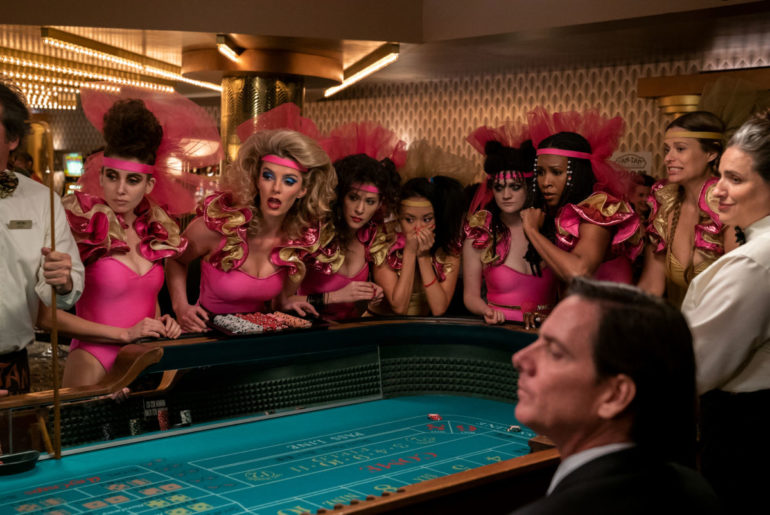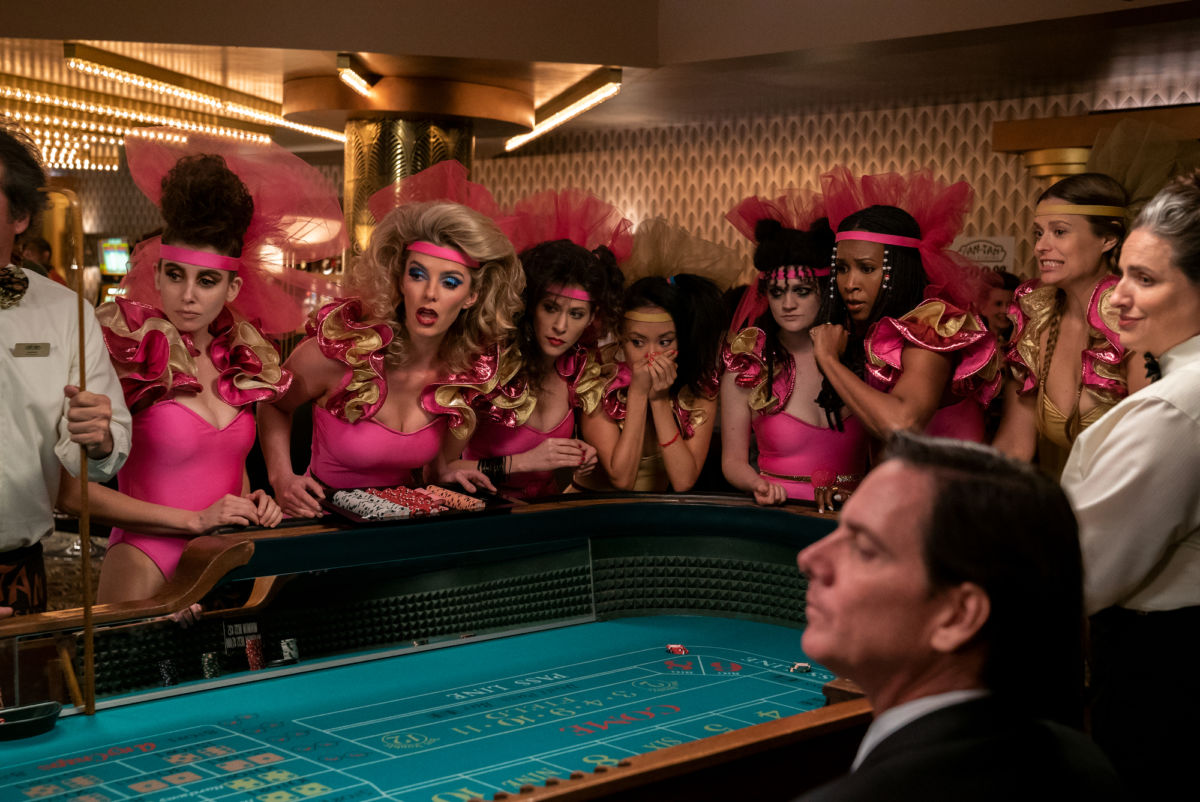Storytelling, in or out of the ring, is at its heart about conflict. Having some challenge to live up to, some enemy to crush, some victory to claim. So with the second season of GLOW leaving off on – and now the third picking up from – the clear high note of the Gorgeous Ladies Of Wrestling having hit it big and taking the show to Las Vegas, going in you have to wonder, ‘where do they go from here?’
But as a young poet who died long before his time once said, “mo’ money mo’ problems”. Success breeds its own issues, and GLOW is confident enough in its narrative and cast that these aren’t sudden, elaborate, external challenges like shouting matches with mobbed-up pit bosses or what have you. Instead, it’s stuff that’s coming decidedly from within – as if the weight of success is forcing open the fault lines.
It’s when these splits and inciting incidents come, often in dramatic, nigh-farcical moments, that GLOW is at its best. Where season three then runs into trouble is in following through on them – and in more than a few cases, it simply doesn’t. Plot strands pop up, and then get forgotten about. None of them are particularly throwaway stuff, either: this season touches on wrestling’s still-perennial problem of performers dealing with injuries by hammering booze and painkillers and ploughing on through.
A huge amount of the premature deaths in the industry are down to heart conditions exacerbated on by use of alcohol, pills, or very often both. Granted, it would be a bit rich to have a TV show magically solve this ongoing, real-life problem, in much the same way as comic books in the 40s couldn’t simply have Superman punch out Hitler – but touching upon it only to drop it as soon as feasibly possible and then carry right along isn’t much better.
Another arc, having been set up in full comedy-of-errors style, is resolved offscreen with a single line of dialogue, then finds itself being repurposed later on to provide the third man in an entirely different romantic subplot. And swaying dangerously into being comic relief as this is, at least it actually goes somewhere. Between the amount of threads dropped and never recovered, and the season’s expansive time-scale, it’s hard not to think that the show’s biting off more than it can chew.
Of course, from the start GLOW was always wrestling (ho ho) with a larger-than-average central group. Inevitably, some of them are going to be sidelined. Kimmy Gatewood and Rebekka Johnson’s characters in particular own this, wandering in and out of scenes like a shorthanded Greek chorus, but some of them just end up sort of there. ‘Also appearing’, as the credits might have it.
This is something of a double-edged sword, as the sheer volume of plot points raised keeps everything moving. In the moment, there’s enough going on that it’s hard to dwell on all those threads you’re waiting to be followed up on. If the show’s lucky, and this does seem to be the gamble it’s making, the ones it drops may simply slip your mind in favour of the ones it chooses to dwell on.
The temptation is obviously to let these plates spin, as then the show can lean on the skills of its – still unimpeachable – cast. But, dare I say it, the show’s stronger when it’s simply got its cast in a room together playing off each other, rather than having skimmed one of them off to haul them through a capital-P Plot.
https://www.youtube.com/watch?v=xQaCxIJX0J0
Possibly the most dramatic change in this season is that there’s a lot less actual wrestling. This decision is positively courageous, and I don’t necessarily mean that in a good way. GLOW’s always been about contrasting the glossy campiness that goes on inside the ring with the grittier stuff behind the scenes (and if ever there was a place to explore that, it’s Vegas), but in this third season the ratio seems a bit off. After all, the opening credits don’t depict the neon outlines of struggling actor-performers.
GLOW’s use of wrestling has always come off a lot like the Coen brothers’ 2016 medley film Hail, Caesar!, whose narrative meanders through any number of Hollywood sets during their big song and dance numbers. These come off partially as elaborate window dressing, but more importantly as clear demonstrations of the sheer technical and dramatic skill involved. In the same way, even fairly slender use of the stage act that’s meant to be the core of the show still has moments of ‘my god, that’s Annie from Community doing that backflip!’
It seems like Kevin Cahoon’s drag show is introduced as a kind of partial replacement. Certainly it has all the glossy campiness required, but as a piece of one coherent whole it simply doesn’t fit in that gap. They are, after all, trying to replace an ensemble with a one-man band.
Ensemble or not, though, the central pillar of the show is, and always has been, the not-quite-friendly not-quite-rivalry between Alison Brie’s Ruth and Betty Gilpin’s Debbie, and it’s here that the splits and divides present really come to the fore, as they spend most of the season in wholly separate plotlines (as does Marc Maron’s token male character). True, it’s not just them drifting apart, as the season rolls on the whole GLOW group seems to be actively splintering under its own weight, but it’s all the more prominent with our duelling protagonists.
(Or, indeed, without them. One conspicuously Ruth-less episode turns out to have Brie directing, an interestingly meta detail as this season sees many of the characters moving beyond simply performing.)
At times their relationship seems to border on the romantic. This isn’t to say there’s some homoerotic subtext at work – there’s nothing subtextual about them, it’s all text. Both clearly value each other a great deal more than any of the male love interests being dangled around them, and have always shared most of the really pivotal scenes. It’s perhaps because of this that the show seems hesitant to use too much of them, for fear of diminishing returns.
The show’s fairly clearly building to something with Ruth and Debbie – in the past GLOW’s been very good at playing the long game, with previously sidelined characters suddenly turning out to be incredibly important. Given the well-deserved acclaim GLOW’s received, it’s understandable they feel so secure in getting another run. However, given Netflix’s recent history of cancelling shows two or three seasons in, this seems like another fairly courageous choice.
Some of the coverage you find on Cultured Vultures contains affiliate links, which provide us with small commissions based on purchases made from visiting our site.


